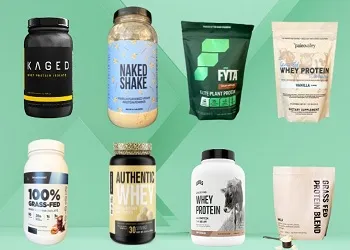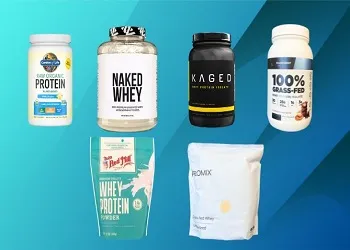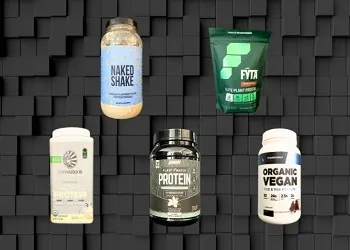These 3 names all sound very similar, and they actually are. Here we’ll outline the major similarities and differences between glutamine, glutamic acid, and glutamate, and give you the scoop on whether or not you should be adding them to your supplement routine.
Table of Contents
What is Glutamine?
Glutamine is an amino acid made of carbon and nitrogen and is also referred to as L-glutamine. Amino acids play many roles in the body, including metabolic communication and protein synthesis. Amino acids exist everywhere in our bodies but are especially important in our skeletal muscles for muscle growth and repair. Glutamine accounts for 50% of the free amino acids in the muscles, making it the most abundant of all 20 amino acids.
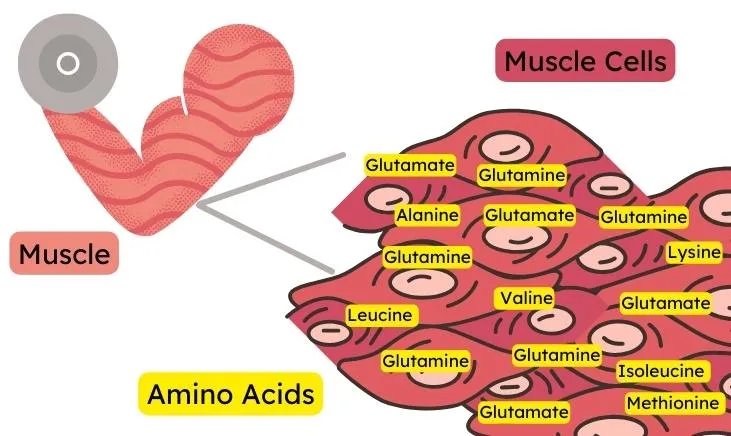
Glutamine is a conditionally essential amino acid meaning that, under normal circumstances, our body is able to make all of the glutamine it needs. However, in stressful times, our body can’t synthesize enough and relies on the glutamine that we get from our diet. These stressful events are usually due to trauma and disease.
Function in the Body
Glutamine serves many purposes in our bodies, including:
- Drives energy metabolism for fast-dividing cells (e.g. the gut)
- Builds proteins—acts as a regulator and is integrated into new proteins
- Builds other non-protein molecules
- Supports acid-base regulation in the lungs
- Participates in gluconeogenesis in the liver
Glutamine’s participation in different pathways depends on the state that your body is in and what molecules are needed. For example, after eating a meal rich in protein, many dietary amino acids are available, including glutamine, so proteins can be synthesized. However, during times of starvation, proteins are broken down for energy. Glutamine will detoxify the by-products of protein breakdown.
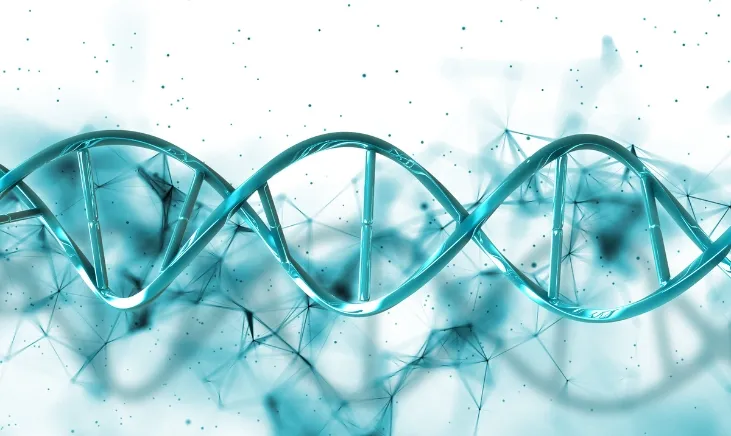
Food Sources
Many foods contain glutamine, especially foods that are high in protein, for example:
- Eggs
- Beef
- Milk
- Tofu
Other foods like rice and corn have relatively high amounts of glutamine compared to other amino acids, but their overall protein content is lower than those listed above.
Glutamate vs Glutamic Acid: What’s the Difference?
Glutamate is a non-essential amino acid, and it is the most abundant amino acid in the brain. Glutamic acid and glutamate are essentially the same thing, but glutamic acid is the acid form and glutamate is the neutral form. So the name varies based on the solution that the amino acid is in.
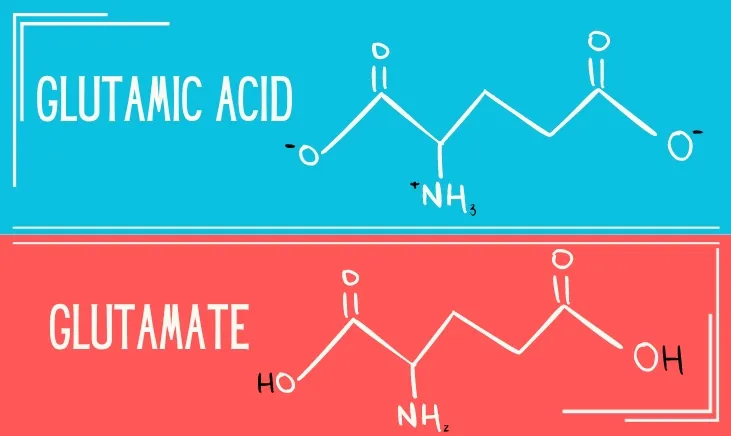
Function in the Body
Since glutamate is found mostly in the brain, it makes sense that glutamate metabolism plays an important role in neural communication. Glutamate is an excitatory neurotransmitter. Neurotransmitters are chemical messengers that communicate between the brain and other nerve cells.
Glutamate also helps to make the inhibitory neurotransmitter GABA.
Food Sources
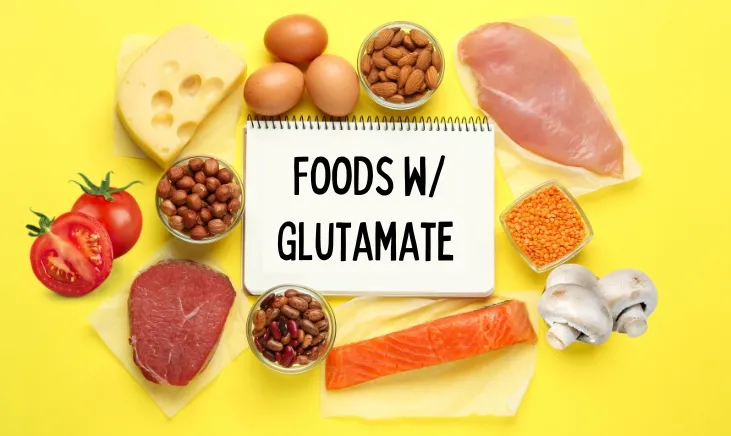
Glutamate is found in protein foods, grains, fruits and vegetables. Some examples include:
- Meat
- Seafood
- Cheese
- Mushrooms
- Tomatoes
Glutamate is often added to foods during processing to enhance flavors. Have you heard of monosodium glutamate (MSG) before? This is a highly studied compound and the controversy surrounding its safety is ongoing. MSG is frequently added to seasonings and condiments to enhance the umami flavor, which is that savory taste that we associate with meats, soups, or sauces. There have been claims that MSG causes side effects such as headaches, nausea, and chest pain. However, it has been well established and stated by the FDA that MSG is safe for consumption and that most people can consume high levels of glutamate from food without problems.
The main takeaway is that our body does not know the difference between “natural” glutamate from meat or mushrooms and glutamate from MSG that’s added to soy sauce. They both undergo the same process once they’re inside of us.
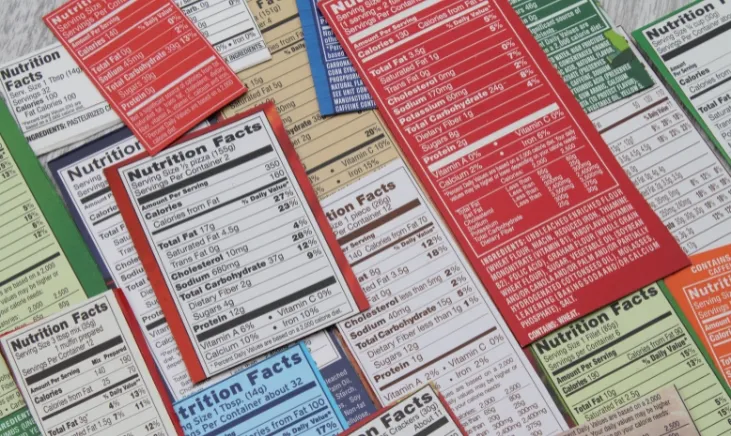
Glutamine vs Glutamate: Key Differences
The most obvious similarity is that glutamine and glutamate are both amino acids derived from proteins, and they are actually very closely related and intertwined. Glutamine and glutamate, along with a few other amino acids, are a part of the “glutamate family” of amino acids. These amino acids are all converted into glutamate during processing in the body.
Remember when we were talking about non-essential amino acids and how we don’t need to get them from our diet because our bodies can make them? Well, to make glutamine, our body uses glutamate, and to make glutamate, our body uses glutamine. This process takes place in the liver.
- Glutamine is converted to glutamate by the enzyme, glutaminase, which uses water to break glutamine into ammonia and glutamate.
- The reverse also occurs for glutamine synthesis, where the enzyme glutamine synthetase uses energy, ammonia, and glutamate to make glutamine.
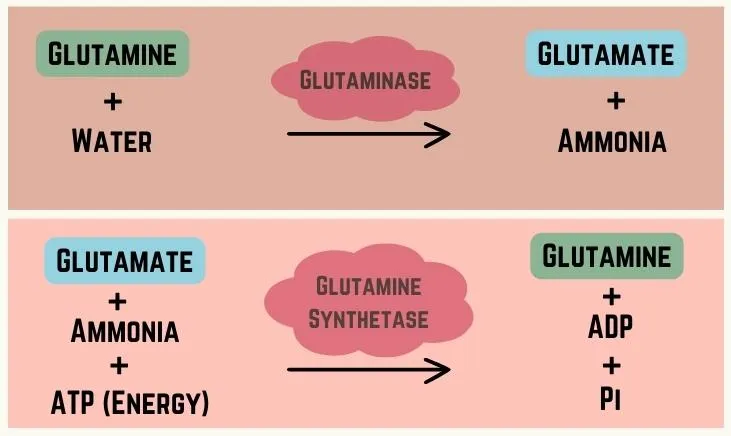
What Are Glutamate and Glutamine Used for in Supplementation?
Glutamine has been well-established as a supplement given to critically ill patients in the hospital, where it becomes an essential amino acid. But its role as an exercise supplement is now being investigated because of the potential benefits in:
- Anti-fatigue
- Increasing lean muscle mass
- Preventing muscle breakdown during muscle recovery
- Improved immune system
- Muscle glycogen resynthesis
- Weight loss
A meta-analysis found that dietary glutamine supplementation did not have a significant effect on aerobic performance and body composition. However, it may affect weight loss, immune reactions, and blood glucose levels post-exercise.
Since glutamate is found ubiquitously in our food, and it is a non-essential amino acid, supplementation is not necessary or recommended for healthy people. As long as you are eating a balanced diet with a variety of different amino acid-containing foods you’ll be getting enough glutamate. Additionally, we do know that too much glutamate in the brain can have serious consequences.

Are Supplements Safe?
Are you interested in adding L-glutamine to your supplement regimen? You should keep in mind that amino acids are readily available in the foods that most of us consume daily. There is greater research needed to establish the future of glutamine supplementation and safe dosing over the long term. However, it appears that supplementing with low doses (3-5 g/day) over the short term is safe.
Summary—Glutamine vs. Glutamic Acid/Glutamate
Glutamic acid vs. glutamine, here are the key takeaways:
- Glutamine, or L-glutamine, is a conditionally essential amino acid and is crucial for building muscle and energy metabolism.
- Glutamate or glutamic acid is a nonessential amino acid that has a major role in brain and nervous system functioning.
- Glutamate and glutamine are converted into one another frequently during metabolic processes.
- Supplementation of these amino acids is not necessary for optimal athletic performance; instead, focus on consuming a well-balanced diet.
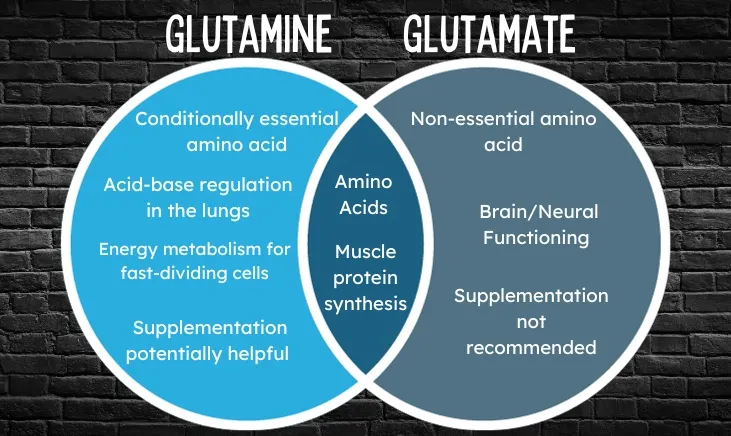
Frequently Asked Questions
Should I take glutamine or glutamate?
The major difference between glutamine and glutamate is that glutamine is a conditionally essential amino acid, while glutamate is non-essential. This means that you don’t need to take glutamate supplements. Glutamine supplements may be beneficial, but more research is still needed to establish this claim.
Does glutamine turn into glutamate?
Yes, the conversion of glutamate or glutamic acid to glutamine is a major reaction that takes place. Glutamine is converted to glutamate by the enzyme, glutaminase, which uses water to break glutamine into ammonia and glutamate.
Does L-glutamine reduce belly fat?
Glutamine can mediate fat metabolism, which could lead to an overall decrease in certain fat stores. A review study showed an association between L-glutamine supplementation and decreased fat mass, but it may be dose-dependent, which has not yet been established.
Who should not take glutamic acid?
Most people do not need to take glutamic acid as our body is capable of making what we need and it is found in a variety of different foods.






